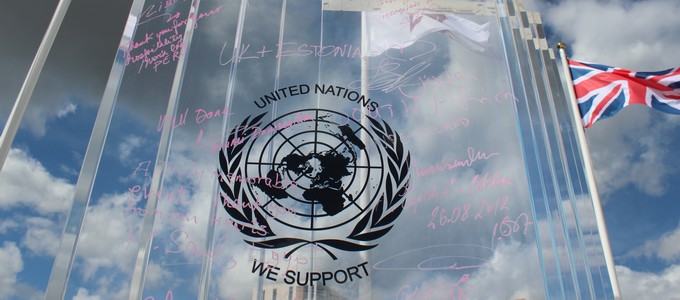Geneva, Sept 10, 2012: Last night, the curtain came down on the London 2012 Paralympic Games, marking the end of a glorious summer not only for elite sport, but also for how sport can contribute to the betterment of our societies. A number of UN organizations and officials contributed to ensuring that both the Olympic and Paralympic Games have a lasting legacy and effect positive social change worldwide.
“Since they had been awarded the 2012 Games, the London organizers had repeatedly set out their ambition to host Games for Everyone,” said UN Secretary-General’s Special Adviser on Sport for Development and Peace, Wilfried Lemke. “The aspirations of the UK Government, the City of London, the organizing committee LOCOG, the International Olympic and Paralympic Committees – under the leadership of their Presidents Jacques Rogge and Sir Philip Craven – and their partners were to organize a meaningful event, going much further than a mere sporting event. They clearly achieved or even surpassed their objectives,” Lemke added.
With sold-out stadiums and venues filled with cheering crowds, streets filled with enthusiastic Londoners and tourists alike, a remarkable level of hospitality and professionalism demonstrated by the 70,000 volunteers, uplifting sporting moments and numerous legacy initiatives having an impact way beyond the track, the 2012 London Games will be remembered as a success story.
Earlier today, Special Adviser Wilfried Lemke met in Geneva with Secretary-General Ban Ki-moon, who is currently on a two-day visit to Switzerland. Mr. Lemke reported on his attendance at the Olympic and Paralympic Games. Furthermore, the two officials had the opportunity to exchange further on how the UN system has been involved in the Games and on the lessons that can be learned for the future. They also agreed on intensifying the collaboration between the Paralympic Movement and the UN in order to continue to advance the rights of persons with disabilities, their inclusion into society, their well-being and empowerment, in particular through the UN Convention on the Rights of Persons with Disabilities.
The Secretary-General expressed once again his pleasure and honour to have represented the United Nations at the opening of the London 2012 Games, as well as his hope that future hosts of sporting events will walk in London’s footsteps by ensuring that their events leave behind a sustainable legacy.
This is in particular true for the Olympic Truce, with the UK Government having initiated an important momentum by delivering around 50 projects worldwide as a key part of their conflict prevention and peace building work, and having signed last May in Moscow, together with the Russian Federation, a joint declaration “to promote and support the ideals of the Olympic Truce.”
This issue was extensively discussed during the meeting that Mr. Lemke had in London on 30 August with UK’s Foreign Office Minister Henry Bellingham, during which the former took the chance to also praise the UK Government for their implementation of the International Inspiration programme, the official international legacy programme of London 2012.
The two officials agreed on strengthening the collaboration between their respective organizations in harnessing the potential of sport-based programmes in promoting development and conflict prevention worldwide.
During their meeting today, Mr. Ban and Mr. Lemke insisted on the need to work closely with Governments in order to ensure the observance of the Truce in connection with future editions of the Olympic and Paralympic Games. Indeed, Resolution 66/5 – which was unanimously co-sponsored and adopted in October 2011 by all 193 UN Member States – was violated by the continued fighting in numerous ongoing armed conflicts around the world.
The two UN officials agreed to encourage Member States to address the issue during the upcoming meeting of the General Assembly on Sport for Development and Peace which will be held next month in New York, where the Secretary-General’s report on the implementation of Resolution 65/4 of 18 October 2010 (“Sport as a means to promote education, health, development and peace”) will be presented.—- UNOSDP/Photo: © UNOSDP/Ina Damerius


Leave a Reply
You must be logged in to post a comment.